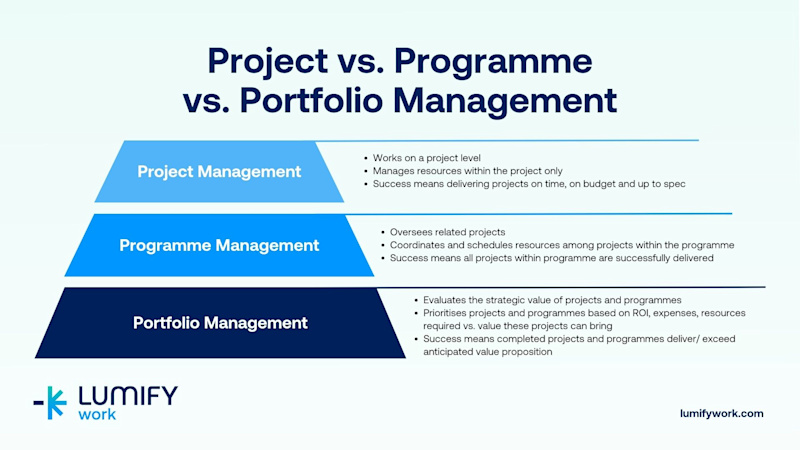How do you ensure your programmes align with your organisation's strategic goals? Understanding programme management is critical to this and to optimising your resources.
But while this term is thrown around from time to time during planning sessions, what is programme management? We dive into its definition, how it relates to project management and the PeopleCert courses you can explore (like MSP, MoP or P3O training) to develop your programme management skills.
What is Programme Management?
Programme management is an organisational function that oversees a group of individual projects linked together through a shared goal or common area of impact.
According to ProductPlan, the programmatic grouping of multiple projects provides synergy, consistent management, and greater stakeholder visibility than individually managed projects.
Here are some key roles and responsibilities in programme management:
Strategic Oversight - Programme management is responsible for consistently delivering large-scale initiatives. It involves overseeing multiple individual projects, typically managed discreetly by project managers. Program managers maintain a strategic plan and schedule for their programs, inform and advise stakeholders, review project status and progress, mentor project managers and ensure the quality of project plans and deliverables.
Holistic View - Programme managers take a holistic view of these projects, evaluating the larger context of the combined organisational impact and interdependencies. While project managers focus on their specific deliverables, program managers always apply a big-picture lens and consider the overall context.
Consistent Governance - Programme managers ensure a consistent level of governance and application of standards across multiple projects. With a single point of oversight, project statuses can be easily rolled up for a global view, allowing the team to enforce baseline quality requirements evenly.
Budget Management - In some cases, program management handles overall budget management, allocating funds appropriately across the entire array of active and planned projects instead of each project competing for funding.
Essential for Transformational Activities - Program management is crucial for executing large strategic initiatives that require cross-functional cooperation and external dependencies. A program management-oriented approach is necessary given the size and scope of such endeavours, whether it's a business transformation, agile adoption, or digital initiative.
Many organisations establish a formal Programme Management Office (PMO) to centralise the management of strategic projects. The PMO assigns program managers and provides templates, best practices, and standard operating procedures, ensuring consistent quality across all projects.
What is a Programme in Project Management?
In project management, a programme is a collection of projects managed as a group to achieve efficiencies of scale.
According to Wrike, some characteristics of a programme include:
General Approach - A programme takes a general approach, with specific details outlined in the individual projects, tasks, and subtasks. It deals with big, overall company goals rather than smaller targets and deliverables.
Strategic Focus - Programmes are strategic. They concentrate on long-term objectives and the multilayered plans needed to achieve them. For instance, imagine a multi-national business aiming to become entirely eco-friendly. This long-term goal would involve several shorter-term projects, such as issuing new company guidelines, rolling out updates across various offices, and launching a marketing campaign to promote the latest principles. Another example could be a merchant’s transition to an entirely electronic payment system, contributing to the greater program goal of digital transformation.
Clarity and Alignment - A programme aligns multiple projects toward one shared goal. Project managers understand their individual deliverables and plan activities according to the programme's strategic objectives.
Efficiency and Oversight - In the programme management process, a collection of projects is housed in one place. Programme managers can use project management software to oversee the progress of all projects at a glance and prioritise resources accordingly.
Risk Management - By enabling project managers to communicate pain points as they arise, a set of best practices can be established to identify similar risks early and avoid repeating mistakes.
Remember, a programme is more than just a sum of its projects—it’s a coordinated effort to achieve something greater!
What is the relationship between Project, Programme and Portfolio Management?
When it comes to Projects vs. Programmes vs. Portfolio Management, you can think of them as layers of initiatives within an organisation. We share some critical features with insights from TechTarget.
Project Management
This is the smallest unit, focusing on individual initiatives. It involves organising resources to achieve specific project goals. These resources include time, budget, and team members.
Key features:
Projects have a well-defined start and end date.
Each project aims at a unique set of goals.
Resources are allocated to individual projects for their completion.
Programme Management
This involves multiple projects with shared objectives. Here, the programme manager oversees a group of related projects (referred to as a programme) to ensure they collectively achieve their intended objectives.
Key features:
Sharing of resources across different similar projects within the programme.
Programmes often take more time to complete than individual projects.
Projects within a programme aim at the same objectives within the organisation.
Portfolio Management
This involves overseeing all projects and programmes and aligning them with the firm’s strategic goals. Portfolio Management (or Project Portfolio Management, PPM) looks at a collection of programs and projects (the portfolio) to achieve the firm’s strategic goals.
Key Features:
Ensures that all projects and programs align with the organisation’s overall goals.
Prioritises certain projects based on their impact on the firm’s objectives.
Has no fixed duration, adapting to the projects and programs it encompasses.
Programme Management Foundation Courses from PeopleCert
If you are exploring how to develop your skills, we recommend a Foundation Certification Course in MoP™, MSP®, or P3O®. You can select from available programme management training from Lumify Work and PeopleCert. Take advantage of the Foundation and Practitioner Combined Course discount to secure your upskilling to the advanced level.
Management of Portfolios (MoP) Foundation
This Management of Portfolios (MoP) course approaches the management of change projects and programmes from a strategic viewpoint. It provides an overview of all change activities, including the inclusions of the portfolio, the costing, organisational and implementation risks, progress tracking, and most importantly, its impact on business as usual and organisational strategic objectives.
Managing Successful Programmes (MSP) Foundation
The Managing Successful Programmes (MSP) course tackles proven best practices and a body of knowledge from many years of real-life experience. It provides a set of principles, governance themes and a transformational flow process that supports those who direct, manage, maintain and deliver programmes.
Portfolio, Programme and Project Offices (P3O) Foundation
What is the P3O certification all about? It stands for Portfolio, Programme and Project Offices and the first edition of the guidance was released in 2008. P3O training courses are necessary for working within any programme or project support office environment. A P3O model supports programmes and projects of all types that aim to bring about change within an organisation.
Access Programme Management Courses with Lumify
PeopleCert is one of the leading players in the global certification industry, partnering with multi-national organisations and government bodies to develop and manage globally recognised certification schemes. PeopleCert has delivered millions of exams in over 150 countries.
Lumify Work (previously known as DDLS) is an Accredited Training Organisation for PeopleCert courses and certifications, including PRINCE2®, ITIL®, MSP, AgileSHIFT®, MoP, and P3O.
Most of our Programme Management Instructors have Expert Level Certifications, real-world involvement and consultancy experience. We help you prepare for your Programme Management exams and implement the methodology successfully within your organisation.
Lumify Work is a leading provider of corporate IT training. Visit one of our ten fully equipped training campuses with 90 classrooms in key business centres around Australia, New Zealand and the Philippines. Full HD video and audio create a virtual classroom experience and access to our pool of expert trainers.
Lumify has campuses in Sydney, Melbourne, Adelaide, Canberra, Brisbane and Perth.
Additionally, through the Lumify Anywhere platform, students can complete their training from the comfort of their own homes, from one of our campuses – or wherever suits them best.
Learn more about PeopleCert Programme Management training when you contact our team. Access our Project Management eBook to learn about different methodologies.







